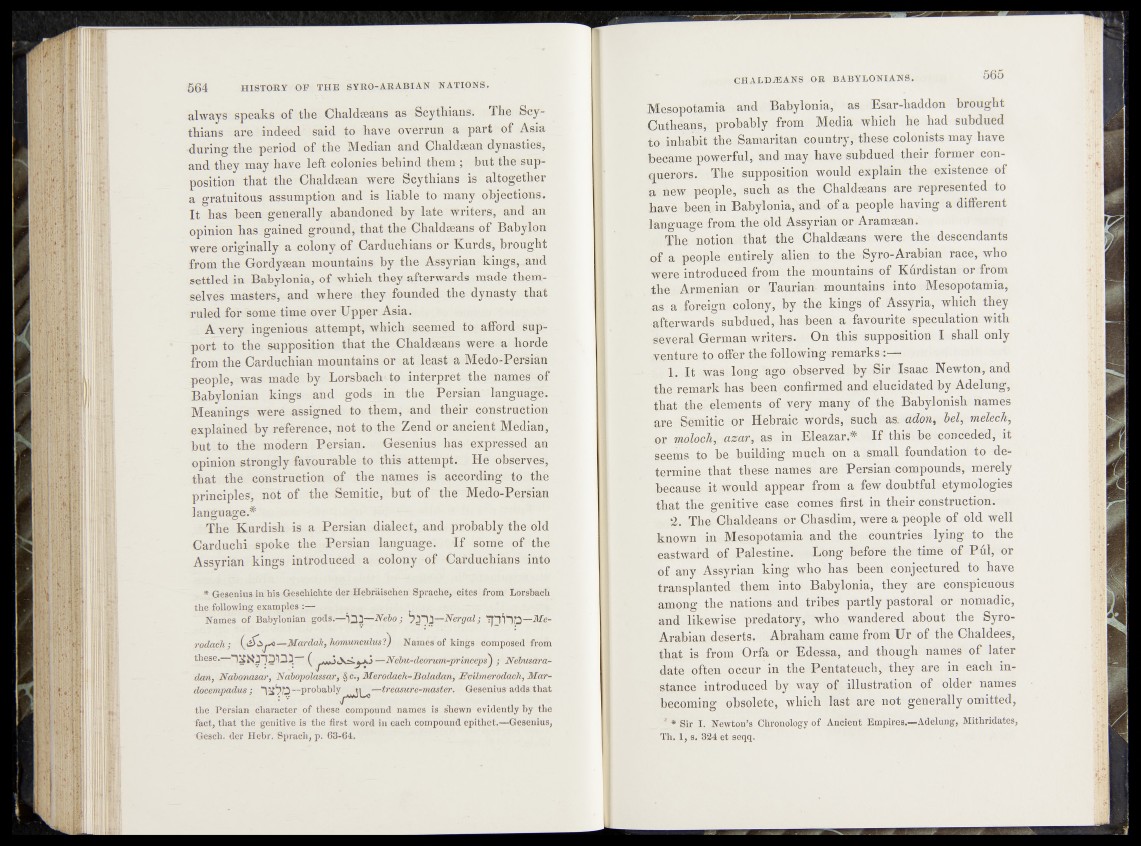
always speaks of the Chaldseans as Scythians. The Scythians
are indeed said to have overran a part of Asia
■during the period of the Median and Ghaldaean dynasties^
and they may have left colonies behind them ; but the .supposition
that the Ghaldsean were Scythians is altogether
a gratuitous assumption and is liable to many objections.
It has been generally abandoned by late Writers, and an
opinion has gained ground, that the Chaldseans of Babylon
were originally a colony of Carduchians or Kurds, brought
from the Gordysean mountains by the Assyrian kings, jaud
settled in Babylonia, of which they afterwards made themselves
masters, and where they founded the dynasty that
ruled for some time over Upper Asia.
A very ingenious attempt, which seemed to afford support
to the supposition that the Chaldseans werb- a> horde
from the Carduchian mountains or at least a- Medo-Persian
people, was made by Lorsbadfoto interpret the namesi .of
Babylonian kings and gods in the Persian' language.
Meanings were assigned to them, and their construction
explained by reference, not to the Zend or ancient Median,
but to the modern Persian. Gesenius- has expressed an
opinion strongly favourable to this attempt.__He observe^
that the construction of the names is according to the
principles, not of the Semitic, bub of~tlre Medo-Persian
language.*
The Kurdish is a Persian dialect,, and probably the- old
Carduchi spoke the Persian language. I f some of the
Assyrian kings introduced a colony of Catduchians into
. * Gesenins in his Geschiehte deiAebraischen Sprache, (files from Lorsbach
the following examples H&Aé 'sMt; i ' , \ t
Names of Babylonian gods.—*^ y y—Nebo ; Nergal; T ftV ip—Merodach;
—Mardak, homunculus ?) Names of kings Composed from
t h e s e . - ^ ^ ^ ^ A - ( ^Nebvrdeorwrv^princepsj; Nebusaradan,
Ndbonasar, Nabopolassar, §<?., Merodach-Baladan, Emlmefodach, M a r-
docempadus; “i 2J1? p —probably^ ^ -trea sure -m a ste r. Gesenius adds th a t
the Persian character of these compound names is shewn evidently by the
fact, th a t the genitive is the first wórd in each compound epithet.—Gesenius,
Gesch. der Hebr. Sprach, p. 63-64.
Mesopotamia and Babylonia, as Esar-haddon brought
Cutheans, probably?, from Media which he had subdued
to inhabit the .Samaritan country, these colonists may have
became powerful, and -may have subdued their former conquerors.
The supposition would explain the existence of
a new people, >such as the Chalds&ans are represented to
h a v e been in Babylonia,hnds©f a people having a different
language from the old Assyrian or Aramaean.
• , The- notion that the Chaldseans wfere the descendants
a peopled ©ntif®l$ alieni#*iha^ro-Arabian race, who
wbre introducedifrom thednountains of Kdrdistanor from
the Armenian Or Taurian- mountains into Mesopotamia,
ns a foreign, nolony, by the kings of Assyria, which they
afterwards subdued, has been a favourite speculation with
several German writers. On this supposition I shall only
venture, to^offer theTollowing .remarks 4—-
, 1 . It was long ago observed, by Isaac Newton, and
,v4jhe remark has been confirmed and dlncid^^d^y^Adelung,
that the elements of very many of the Babylonish names
are Semitic or Hebraic words, such as. adon, bely-mehch,
or molodi^azm^ as |g Eleazar * If thisibe-conceded, it
Seems »to be building much- >®n a .small foundation to de-
termine that these names are Persian icorapounds, merely
because it wOuld appear from a fow doubtful etymologies
Ibat the .^litive case cOines first in their construction.
2. The Chaldeans or Chasdi-m, were a people of old well
known in Mesopotamia and the countries->lying to the
eastward of Palestine.; Long before the time of Mlpor
of any Assyrian king who %tS: been conjectured to have
transplanted them into Babylonia, they vare conspicuous
among the nations and tribes partly pastoral or nomadic,
and likewise predatory, who wandered about the Syro-
Arabian deserts. Abraham came from Ur n f the. Ghaldees,
that is from Orfa or EdesSa, and though namc^ of later
date often occur in Ibe P e p t a t^ l^ t t ^ are inieaeh instance
introduced *by way of illustration of older names
becoming obsolete, which? last are not generally-omitted,
* * Sir. .I, Newton’s Chronology of Ancient Empires.—rAdelung, Mithridates,
Th. 1, s. 324 et seqq.